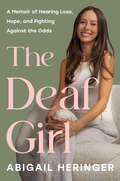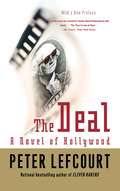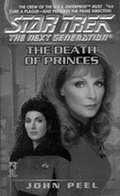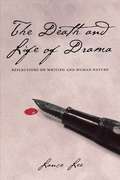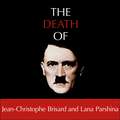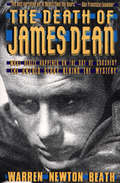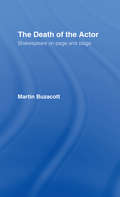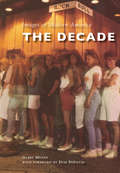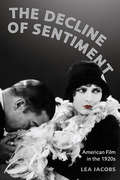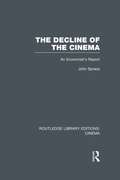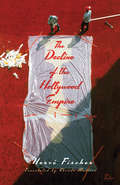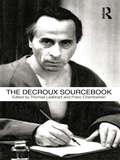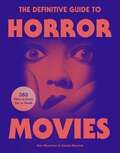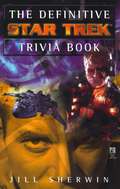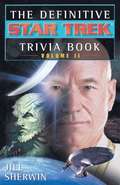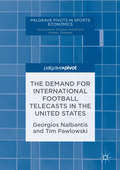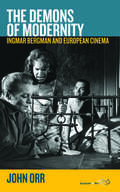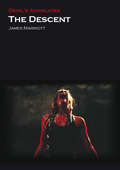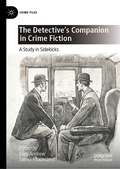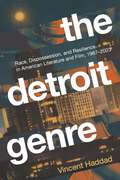- Table View
- List View
The Deaf Girl: A Memoir of Hearing Loss, Hope, and Fighting Against the Odds
by Abigail HeringerAn inspiring story of hearing loss and hope from The Bachelor's first deaf contestantAbigail Heringer made her television debut as an instant fan-favorite on season 25 of The Bachelor. Stepping out of the limousine, she approached her bachelor with a playful declaration: she would be staring at his lips all night for two compelling reasons—her profound deafness since birth and because he had some nice lips!But Abigail's journey wasn't always marked by such confidence. Growing up deaf and introverted, she dreaded being the center of attention, fearing her disability would burden those around her. Among her hearing peers, she felt like an outsider, simply labeled as "the deaf girl." And after receiving a cochlear implant at the age of two, she subsequently struggled to find her place in the Deaf community too. Caught in between two worlds and grappling to define her identity as a deaf woman, Abigail felt like she belonged in neither.Supported by her family, particularly her deaf older sister Rachel, Abigail has come to understand that while being deaf is part of her identity, it doesn't define her. Throughout her journey, marked by challenges and adversity, Abigail has grown into her own strongest advocate, discovering a new voice that is confident, fearless, and empowered—a voice that enables her to proudly reclaim the title of "the deaf girl" she once resisted and rewrite it as a testament to her resilience and strength.Hopeful, vulnerable, and uplifting, The Deaf Girl shares Abigail's journey of navigating life with a profound hearing loss and her transformation from merely accepting her disability to embracing it wholeheartedly. This memoir serves as an inspiring reminder for anyone who has ever felt like an outsider or struggled to embrace their differences, showcasing that every voice is worthy of being heard.
The Deaf Musicians
by Pete Seeger Paul Dubois JacobsLee is a piano man. Every night, he plays jazz for the crowd. It sounds something like this:<P><P> Plink-a-plink-BOMP-plink-plink.<P> Yimba-timba-TANG-ZANG-ZANG.<P> One night, Lee's bandmates notice something is off. Lee's music comes out like this:<P> Ronk. Phip. Tonk.<P> There's no way to hide it: Lee is losing his hearing. Then Lee discovers sign language. And soon after, he meets Max, who plays the sax. Together they form a new band-the Deaf Musicians. But who will listen to a deaf musician? <P> With The Deaf Musicians, Pete Seeger, Paul DuBois Jacobs, and three-time Coretta Scott King Honor winner R. Gregory Christie present an inspiring story of overcoming obstacles, set to a jazzy score.<P> OO-AH, BE-DOOP, BE-DOOP, OO-AH, YEAH!<P> Winner of the Schneider Family Book Award
The Deal
by Peter LefcourtWashed-up Hollywood producer Charlie Berns has mailed in his updated obit and is about to suck his Mercedes tailpipe and fade to black when a miracle materializes: his nephew, a wannabe screenwriter from New Jersey, has scripted the life story of Queen Victoria's prime minister Benjamin Disraeli, which Charlie manages to turn into a hot property that reinstates him as a player. But as the deal heats up, a few conceptual changes morph the project into Lev Disraeli: Freedom Fighter, an action thriller with a black Jewish superstar, a Yugoslavian location, a mad Polish director, and even a real-life kidnapping. Is Charlie Berns being eaten alive by the system? Or is he giving the Hollywood hotshots a run for their money? Peter Lefcourt's hilarious satire proves the old adage that in Hollywood you're never quite as dead as people give you credit for.
The Death Of A Prince (Star Trek #44)
by John PeelDangerous assignments come in pairs when Captain Picard and his crew are confronted with two desperate missions on two different worlds. On the planet Buran, newly linked to the Fedration, a mysterious disease devastates the population-and turns them against the visitors from the U.S.S. Enterprise. Meanwhile, on nearby lomides, a renegade Federation observer has disappeared, intent on violating the Prime Directive by preventing a tragic political assassination. While Dr. Crusher struggles to find a cure for the plague ravaging Buran, Commander Will RIker leads an Away Team to lomides. Their forces divided, Picard and his crew find themselves the only hope of two worlds.
The Death and Life of Drama: Reflections on Writing and Human Nature
by Lance LeeWhat makes a film "work," so that audiences come away from the viewing experience refreshed and even transformed in the way they understand themselves and the world around them? In The Death and Life of Drama, veteran screenwriter and screenwriting teacher Lance Lee tackles this question in a series of personal essays that thoroughly analyze drama's role in our society, as well as the elements that structure all drama, from the plays of ancient Athens to today's most popular movies. Using examples from well-known classical era and recent films, Lee investigates how writers handle dramatic elements such as time, emotion, morality, and character growth to demonstrate why some films work while others do not. He seeks to define precisely what "action" is and how the writer and the viewer understand dramatic reality. He looks at various kinds of time in drama, explores dramatic context from Athens to the present, and examines the concept of comedy. Lee also proposes a novel "five act" structure for drama that takes account of the characters' past and future outside the "beginning, middle, and end" of the story. Deftly balancing philosophical issues and practical concerns, The Death and Life of Drama offers a rich understanding of the principles of successful dramatic writing for screenwriters and indeed everyone who enjoys movies and wants to know why some films have such enduring appeal for so many people.
The Death of Hitler: The Final Word on the Ultimate Cold Case: The Search for Hitler's Body
by Jean-Christophe Brisard Lana ParshinaA dramatic and revelatory new account of the final days in Hitler's bunker, based on new access to previously unseen Soviet archives, previously unseen materials, and cutting edge forensics.After two years of nonstop negotiations with the Russian authorities, Jean-Christophe Brisard and Lana Parshina were granted access to secret files detailing the Soviets' incredible hunt to recover Hitler's body: the layout of the bunker, plans for escaping, eyewitness accounts of the Führer's final days, and human remains-a bit of skull with traces of the lethal bullet and a fragment of jaw bone. For the first time, the skull, teeth and other elements were analysed by a medical examiner with cutting edge forensics equipment. The authors use these never before seen documents and research to reconstruct the events in fascinating new detail.(P)2018 Hodder & Stoughton Limited
The Death of James Dean
by Warren Newton BeathWith extensive research, this account of the Hollywood star and his legion of fans offers “the best narrative yet of Dean’s final ten hours” (San Francisco Examiner). Just before sunset on September 20, 1955, James Byron Dean’s Porsche 550 Spyder collided with Donald Gene Turnupseed’s Ford Tudor on California Highway 46. At age twenty-four, America’s newest screen idol was dead. But what really happened? Drawing on original documents, including the coroner’s inquest and other previously unpublished material, author Warren Newton Beath provides a painstakingly accurate reconstruction of Dean’s final hours and tragic death. In addition, Beath explores Dean’s life and his enduring status as a cultural icon, including Elvis Presley’s worship of him; Hitchcock’s use of Highway 46 in the famous crop-dusting scene in North by Northwest; death threats against Giant director George Stevens if he dared excise a single frame of Deans’ final performance; and many more fascinating facts about the enigmatic screen legend. Beath’s definitive account concludes with a memorable portrait of the James Dean cult, a strangely moving record of his posthumous life in the hearts of his adoring fans.
The Death of the Actor: Shakespeare on Page and Stage
by Martin BuzacottIn The Death of the Actor Martin Buzacott launches an all-out attack on contemporary theatrical practice and performance theory which identifies the actor, rather than the director, as the key creative force in the performance of Shakespeare. Because actors are absent from the site of Shakespearean meaning, he argues, the illusion of their centrality is sustained only by a rhetoric of heroism, violence and imperialism.
The Decade (Images of Modern America)
by Gabby Means Dom DisilvioThe Decade was the birthplace of rock 'n' roll in Pittsburgh, at the corner of Atwood and Sennott. The eclectic bar with parachutes covering the ceiling was home base for local bands such as the Iron City Houserockers, but it also served as a showcase for rising international recording acts, including the Police, U2, the Red Hot Chili Peppers, and the Ramones. Under the shadow of the University of Pittsburgh, The Decade was an oasis of live rock and blues music in the 1970s to the early 1990s. The small venue had wide appeal to bands who felt they could intimately connect with their audience. Owned and operated by Dom DiSilvio, The Decade will forever be a home to many Pittsburghers, and Images of Modern America: The Decade is a home for their stories.
The Declaration of Cartoon Independents!: The Channel Frederator & Cartoon Hangover Selected Postcards 2008-2015
by Matt Gielen Fred SeibertMore than 120 full color postcard illustrations from the leading online animation network. Over the past 10 years, Channel Frederator's become the world's biggest animation network, built, film by film, by thousands of animators across the globe. Each of the creators completely controls their own channel, makes all their own decisions. There are no filters, no gatekeepers, no barriers to the expressions of these intrepid souls. Just the raw, direct, and often sophisticated moving picture expressions of the characters they love, the worlds they inhabit, and the stories they tell.
The Decline of Sentiment: American Film in the 1920s
by Lea JacobsThe Decline of Sentiment seeks to characterize the radical shifts in taste that transformed American film in the jazz age. Based upon extensive reading of trade papers and the popular press of the day, Lea Jacobs documents the films and film genres that were considered old-fashioned, as well as those dubbed innovative and up-to-date, and looks closely at the works of filmmakers such as Erich von Stroheim, Charlie Chaplin, Ernst Lubitsch, and Monta Bell, among many others. Her analysis--focusing on the influence of literary naturalism on the cinema, the emergence of sophisticated comedy, and the progressive alteration of the male adventure story and the seduction plot--is a comprehensive account of the modernization of classical Hollywood film style and narrative form.
The Decline of the Cinema: An Economist’s Report (Routledge Library Editions: Cinema)
by John SpraosBetween 1952 and 1962, when this book was originally published, the number of people visiting British cinemas had fallen by nearly two thirds and was little more than half the pre-war total. Nearly 1500 of the 4500 cinemas functioning in 1955 had closed five years later, and the author here predicts a further substantial fall. The causes of this drastic decline are traced to the competition of television but also to the dramatic halving of the number of new American films and to the difficulty of transferring a cinema’s ‘congregation’ when it is closed. This decline has few parallels in recent times and in conjunction with a disproportionate and unexpected increase in the price of seats presents a fascinating study for the economist, which the author fully exploits. But the film industry is of general interest so that the author’s conclusions and his social recommendations will appeal to the general reader as well as those in the industry.
The Decline of the Hollywood Empire
by Hervé FischerThe Hollywood empire was built over the course of a century through hard-nosed business practices such as block booking, dumping and buying up the competition, turning the silver screen into a goldmine in the process. The business logic that has driven the industry since its beginnings has gone into hyperdrive in recent years, with astronomical sums invested in productions and promotion. Ironically that massive outlay has gone toward churning out a flat, made-in-Hollywood universalism that can be exported planet-wide, but which is simultaneously losing audiences, primarily to the digital world, at an accelerating pace. The apparently insurmountable barriers of finance and distribution to entry into the world of entertainment have served, so far, to keep smaller players out of the frame and, Fischer contends, have destroyed the industry's creative potential. It turns out too much money can kill cinema just as certainly as not enough. In The Decline of the Hollywood Empire, artist and philosopher Hervé Fischer heralds an inevitable move from 35 mm to digital distribution, which will take what has until now existed only on the margins of the "entertainment industry"--independent film, amateur film, documentary and other genres--from bit players to starring roles: how the Trojan horse of digital technology and distribution, in the hands of independent producers, could well toll the bell for Hollywood's hegemony in the business of film.
The Decroux Sourcebook
by Franc Chamberlain Thomas LeabhartThe Decroux Sourcebook is the first point of reference for any student of the ‘hidden master’ of twentieth century theatre. This book collates a wealth of key material on Etienne Decroux, including: an English translation of Patrice Pezin’s ‘Imaginary Interview’, in which Decroux discusses mime’s place in the theatre. previously unpublished articles by Decroux from France’s Bibiothèque Nationale. essays from Decroux’s fellow innovators Eugenio Barba and Edward Gordon Craig, explaining the synthesis of theory and practice in his work. Etienne Decroux’s pioneering work in physical theatre is here richly illustrated not only by a library of source material, but also with a gallery of images following his life, work and influences. The Decroux Sourcebook is an ideal companion to Thomas Leabhart’s Etienne Decroux in the Routledge Performance Practitioners series, offering key primary and secondary resources to those conducting research at all levels.
The Definitive Desert Island Discs: 80 Years of Castaways
by Ian GittinsEight tracks. Endless stories.Allow yourself to be cast away in eight glorious decades of the most iconic show on radio. To mark this momentous occasion, The Definitive Desert Island Discs focuses on 80 of the most powerful and unforgettable interviews, revisiting every era of Desert Island Disc's storied history.Reflecting on how times have changed, the book will feature brand new material as castaways are interviewed about their experiences - did the conversation go how they expected? Would Sir Patrick Stewart still take his beloved billiards table (and a shed to keep it in, of course)? And does Hilary Devey stick by her endless supply of Cointreau?Get lost in lists of the weirdest and most wonderful luxury items, most popular tracks and books throughout the years, and more. Introduced by Lauren Laverne, The Definitive Desert Island Discs is a must-have gem, celebrating an incredible institution that has captured the hearts of a nation for 80 years.
The Definitive Guide to Horror Movies
by Kim Newman James MarriottPull back the curtain on more than a century of terrifying horror movies... if you dare.Packed with stills from the most terrifying scenes in cinema history, The Definitive Guide to Horror Movies is a comprehensive companion to the genre, tracing the story of horror film, decade-by-decade. Providing a witty and informative critique of more than 350 films and several TV series, this extensive handbook offers a superb introduction for newcomers to the genre as well as something new for the die-hard horror fan.Horror is one of the most popular and influential genres in cinema, a perennial favourite that just won't stay dead. This fully updated edition covers everything from all-time classics to hidden gems and big-budget duds to breakout foreign hits. This is your ultimate guide through a century of fear.
The Definitive Star Trek Trivia Book
by Jill SherwinSO YOU THINK YOU KNOW STAR TREK®? WELL, FIRE UP THOSE NEURONS, BECAUSE HERE'S YOUR CHANCE TO PROVE IT! The ultimate collection of memory testers, brainteasers, and mind-bending minutiae from thirty-four years of movies and TV series. More than two thousand fill-in-the-blanks, multiple-choice questions, and matching questions are organized into themed chapters such as "Galactic History," "About the Crews," "Alien Species," "Star Trek Science," and "Command Questions. " This jam-packed, fun-filled illustrated trivia book is just what devoted Star Trek fans have always wanted: the means to test themselves and one another on one of the richest and most complex fictional universes ever created.
The Definitive Star Trek Trivia Book: Star Trek All Series (Star Trek)
by Richard Oriolo Jill SherwinSO YOU THINK YOU KNOW STAR TREK? WELL, FIRE UP THOSE NEURONS, BECAUSE HERE'S YOUR CHANCE TO PROVE IT!-- 1 How many tribbles did Spock calculate had bred aboard Deep Space Station K-7?_____________________________-- 2 What type of life-form was the Caretaker?A. Sporocystian B. Solanagen C. Silicon D. Unidentifiable-- 3 In which episode is a deaf mediator the key to ending a war that has persisted for fifteen centuries?______________________________-- 4 Identify each species: A. __________B. __________C. __________-- 5 Match the ship with its appropriate registry number: A. U. S. S. Voyageri. NX-74205B. U. S. S. Defiantii. NX-2000C. U. S. S. Pegasusiii. NCC-74656D. U. S. S. Excelsioriv. NCC-53847-- 6 Name: A. Sulu's daughter _____________B. Troi's older sister _____________C. Kira's father _____________D. Tuvok's wife _____________The answers to those questions and many others are just pages away in THE DEFINITIVE STAR TREK TRIVIA BOOK, the ultimate collection of memory testers, brainteasers, and mind-bending minutiae from thirty-four years of movies and TV series. Nearly three thousand fill-in-the-blanks, multiple-choice questions, and matching questions are organized into themed chapters such as "Galactic History", "About the Crews", "Alien Species", "Star Trek Science", and "Command Questions". This jam-packed, fun-filled illustrated trivia book is just what devoted Star Trek fans have always wanted: the means to test themselves and one another on one of the richest and most complex fictional universes ever created. -- See reverse side for the answers!
The Demand for International Football Telecasts in the United States
by Tim Pawlowski Georgios NalbantisThis book provides a comprehensive overview and economic analysis of US consumer demand for televised football (soccer). Accounting for transnational demand, research is focused on the US consumers demand for the English Premier League, Spanish La Liga, Italian Serie A, German Bundesliga, French Ligue 1 and the UEFA Champions League, which represent the most popular and marketable football competitions worldwide, and have recently sealed lucrative media rights contracts in many large markets, including the US. The study also takes account of North American Major League Soccer (MLS) in order to provide a more comprehensive overview of the country's football market and to allow for direct comparisons with the aforementioned European competitions. These findings offer valuable insights for US broadcasters, European league organizers and managers to adjust existing strategies and/or develop new strategies in conquering the US football market.
The Demons of Modernity: Ingmar Bergman and European Cinema
by John OrrIngmar Bergman's films had a very broad and rich relationship with the rest of European cinema, contrary to the myth that Bergman was a peripheral figure, culturally and aesthetically isolated from the rest of Europe. This book contends that he should be put at the very center of European film history by chronologically comparing Bergman's relationship to key European directors such as Carl Theodor Dreyer, Jean-Luc Godard, Michelangelo Antonioni, and Andrei Tarkovsky, and also looks at Bergman's critical relationship to key movements in film history such as the French New Wave. In so doing, it demonstrates how Ingmar Bergman's films illustrate the demonic struggle in modernity between faith and secularity through "his intense preoccupation with the malaise of intimacy."
The Descent
by James MarriottThe story of an all-female caving expedition gone horribly wrong, The Descent (2005) is arguably the best of the mid-2000s horror entries to return verve and intensity to the genre. Unlike its peers (Saw [2004], Hostel [2011], etc.), The Descent was both commercially and critically popular, providing a genuine version of what other films could only produce as pastiche. For Mark Kermode, writing in the Observer, it was "one of the best British horror films of recent years," and Derek Elley in Variety described it as "an object lesson in making a tightly-budgeted, no-star horror pic." Time Out's critic praised "this fiercely entertaining British horror movie;" while Rolling Stone's Peter Travers warned prospective viewers to "prepare to be scared senseless." Emphasizing female characters and camaraderie, The Descent is an ideal springboard for discussing underexplored horror themes: the genre's engagement with the lure of the archaic; the idea of birth as the foundational human trauma and its implications for horror film criticism; and the use of provisional worldviews, or "rubber realities," in horror.
The Descent
by James MarriottThe story of an all-female caving expedition gone horribly wrong, The Descent (2005) is arguably the best of the mid-2000s horror entries to return verve and intensity to the genre. Unlike its peers (Saw [2004], Hostel [2011], etc.), The Descent was both commercially and critically popular, providing a genuine version of what other films could only produce as pastiche. For Mark Kermode, writing in the Observer, it was "one of the best British horror films of recent years," and Derek Elley in Variety described it as "an object lesson in making a tightly-budgeted, no-star horror pic." Time Out's critic praised "this fiercely entertaining British horror movie;" while Rolling Stone's Peter Travers warned prospective viewers to "prepare to be scared senseless." Emphasizing female characters and camaraderie, The Descent is an ideal springboard for discussing underexplored horror themes: the genre's engagement with the lure of the archaic; the idea of birth as the foundational human trauma and its implications for horror film criticism; and the use of provisional worldviews, or "rubber realities," in horror.
The Descent (Devil's Advocates)
by James MarriottThe story of an all-female caving expedition gone horribly wrong, The Descent (2005) is arguably the best of the mid-2000s horror entries to return verve and intensity to the genre. Unlike its peers (Saw [2004], Hostel [2011], etc.), The Descent was both commercially and critically popular, providing a genuine version of what other films could only produce as pastiche. For Mark Kermode, writing in the Observer, it was "one of the best British horror films of recent years," and Derek Elley in Variety described it as "an object lesson in making a tightly-budgeted, no-star horror pic." Time Out's critic praised "this fiercely entertaining British horror movie;" while Rolling Stone's Peter Travers warned prospective viewers to "prepare to be scared senseless." Emphasizing female characters and camaraderie, The Descent is an ideal springboard for discussing underexplored horror themes: the genre's engagement with the lure of the archaic; the idea of birth as the foundational human trauma and its implications for horror film criticism; and the use of provisional worldviews, or "rubber realities," in horror.
The Detective's Companion in Crime Fiction: A Study in Sidekicks (Crime Files)
by Lucy Andrew Samuel SaundersThis book aims to establish the position of the sidekick character in the crime and detective fiction literary genres. It re-evaluates the traditional view that the sidekick character in these genres is often overlooked as having a small, generic or singular role—either to act as the foil to the detective in order to accentuate their own abilities at solving crimes, or else to simply tell the story to the reader. Instead, essays in the collection explore the representations and functions of the detective’s sidekick across a range of forms and subgenres of crime fiction. By incorporating forms such as children’s detective fiction, comics and graphic novels and film and television alongside the more traditional fare of novels and short stories, this book aims to break down the boundaries that sometimes exist between these forms, using the sidekick as a defining thread to link them together into a wider conceptual argument that covers a broad range of crime narratives.
The Detroit Genre: Race, Dispossession, and Resilience in American Literature and Film, 1967-2023
by Vincent HaddadDetroit has an essential relationship to genre in American literature and popular culture. The contemporary formations of the suburban sitcom, the post-apocalyptic genre, the sci-fi dystopia, crime fiction, the superhero genre, and contemporary horror would not exist in the way they do today without the aesthetic material and racial history of Detroit. When DC Comics wanted to compete with Marvel and market “socially relevant” comics, especially ones dealing with issues of race, they swapped Gotham and Metropolis for Detroit. What about vampires concerned with de-industrialization, heritage conservation, and impending water wars? Must be Detroit. A story about a half-man, half-robot wrestling with what it means to be human by fighting crime? Improbably, Detroit has two. Author Vincent Haddad’s The Detroit Genre provides the first comprehensive literary and cultural investigation of the representations of Detroit in popular and literary culture. The book first establishes the concept of the “Detroit genre” that emerged in late 1960s and traces the tropes of this white-centric narrative genre in popular culture, touching on key texts including Blue Collar, Robocop, The Crow, It Follows, and Barbarian. The second part shows how Black writers, including Alice Randall, adrienne maree brown, Stephen Mack Jones, and Angela Flournoy, reclaimed and revised the Detroit genre by un-fixing Detroit narratives of dispossession, criminality, and industrial and social failure through formal experimentations on genre itself. Where Detroit has typically been painted in the news as one of three things—the center of the automotive industry; crime-ridden and in ruins; or as a “blank canvas” with limitless potential of entrepreneurship—Vincent Haddad shows that the Detroit genre in literature and film can be far more powerful than news media in narrating Black dispossession as a pragmatic, even liberal consensus. The texts studied here condition forgetfulness about Detroit’s history or expose it to a full reckoning, direct attention toward or away from the city’s agents of injustice, fetishize resilience or model resistance, and foreclose or imagine a future of Black liberation. Appealing to scholars of popular literature, media, race, and American studies, The Detroit Genre is an accessible and engaging study of the city’s influence on a wide array of genres in pop culture.
